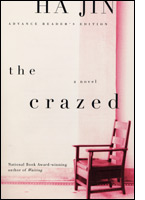
Like Waiting, Ha Jin’s 1999 National Book Award-winning novel about a Red Army doctor who battles 18 years of bureaucratic indifference to obtain a contested divorce, The Crazed is a novel about shunted possibilities. But instead of tracing a broad arc of history, this deceptively small book zeroes in on the spring of 1989, at a public university far from Beijing, where the student uprising in Tiananmen Square is coming slowly to a boil.
For most of The Crazed, that impending history is no more than an undercurrent to the quiet story of Jian, a Ph.D. candidate in comparative literature who should be studying for his exams but instead finds himself caring for his stroke-addled adviser. The bedridden mentor reveals his own story through tormented ramblings that hint at great suffering (at the hands of Cultural Revolutionaries and back-stabbing colleagues) and frustrated ambitions (as a husband marooned in a loveless marriage and a scholar constrained by the dictates of Party politics).
The rudderless Jian, meanwhile, soon loses his passion for his studies and spends his afternoons parsing his teacher’s crazed lectures for truths that might help him chart his own course in life. Ultimately, though, The Crazed is a tragedy, and as the novel snaps to a close, personal and national history draws Jian into a Kafka-esque maze. He discovers that life choices he’s been agonizing to make have already been plotted for him, and he gets swept, almost unwittingly, into the bloodbath in Beijing. In the end, Ha Jin suggests, insanity in the face of totalitarianism is not only understandableÑit may be the only reasonable response.















